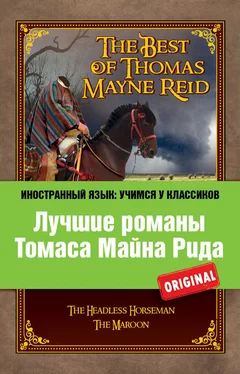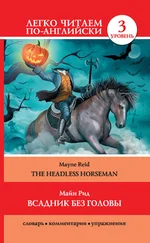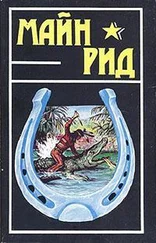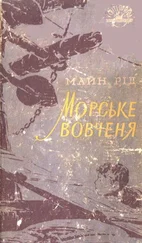A slight elevation of the ground, caused by the crumbling ruins of an old wall, furnished the vidette station desired; and the Maroon mounting upon this, took his stand to watch the verandah. He could see the long gallery from end to end on two sides of the dwelling, and he knew that it extended no farther.
Though the house glistened under a clear moonlight, the verandah itself was in shade; as was also the courtyard in front – the old grey pile projecting its sombre shadow beyond the walls that surrounded it. At the end, however, the moonbeams, slanting diagonally from the sky, poured their light upon the floor of the verandah, there duplicating the strong bar-like railing with which the gallery was inclosed.
The Maroon had not been many minutes upon the stand he had taken, when an object in the verandah arrested his attention. As his eye became more accustomed to the shadowy darkness inside, he was able to make out something that resembled a hammock, suspended crosswise, and at some height above the balustrade [560] of the verandah. It was near that end where the moonlight fell upon the floor.
As the moon continued to sink lower in the sky, her beams were flung farther along the gallery; and the object which had attracted the attention of Cubina came more into the light. It was a hammock, and evidently occupied. The taut cordage told that some one was inside it.
“If it should be the young Englishman himself!” was the conjectural reflection of Cubina.
If so, it might be possible to communicate with him at once, and save the necessity of waiting till daybreak.
How was the Maroon to be satisfied that it was he? It might be some one else! It might be Ravener, the overseer; and Cubina desired no conversation with him. What step could he take to solve this uncertainty?
As the Maroon was casting about for some scheme that would enable him to discover who was the occupant of the hammock, he noticed that the moonbeams had now crept nearly up to it, and in a few minutes more would be shining full upon it. He could already perceive, though very dimly, the face and part of the form of the sleeper inside. Could he only get to some elevated position a little nearer to the house, he might be able to make out who it was.
He scanned the ground with a quick glance. A position sufficiently elevated presented itself, but one not so easy to be reached. A cocoa-nut palm stood near the wall, whose crest of radiating fronds overlooked the verandah, drooping towards it. Could he but reach this tree unobserved, and climb up to its crown, he might command a close view of him who slept in the swinging couch.
A second sufficed to determine him; and, crawling silently forward, he clasped the stem of the cocoa-tree, and “swarmed” upward. The feat was nothing to Cubina, who could climb like a squirrel.
On reaching the summit of the palm, he placed himself in the centre of its leafy crown – where he had the verandah directly under his eyes, and so near that he could almost have sprung into it.
The hammock was within ten feet of him; in a downward direction. He could have pitched his tobacco-pipe upon the face of the sleeper. The moonlight was now full upon it. It was the face of Herbert Vaughan!
Cubina recognised it at the first glance; and he was reflecting how he could awake the young Englishman without causing an alarm, when he heard a door turn upon its hinges. The sound came up from the courtyard; and on looking in that direction, Cubina saw that the gate leading out to the cattle enclosure was in the act of being opened.
Presently a man passed through, entering from the outside; and the gate, by some other person unseen, was closed behind him.
He who had entered walked directly towards the dwelling; and, mounting the steps, made his way into the verandah.
While crossing the courtyard, the moonlight, for a moment, fell upon his face, discovering to Cubina the sinister countenance of the Jew.
“I must have passed him on the path!” reflected the Maroon. “But no, that couldn’t be,” he added, correcting himself; “I saw his return track in the mud-hole just by. He must have got here before me. Like enough, he’s been back, and out again on some other dark business. Crambo ! it’s true enough what I’ve heard say of him: that he hardly ever goes to sleep. Our people have met him in the woods at all hours of the night. I can understand it now that I know the partner he’s got up there. Por Dios ! to think of Chakra being still alive!”
The Maroon paused in his reflections; and kept his eye sharply bent upon the shadowy form that, like a spirit of darkness, was silently flitting through the corridor. He was in hopes that the Jew would soon retire to his chamber.
So long as the latter remained outside, there was not the slightest chance for Cubina to communicate with the occupant of the hammock without being observed. Worse than that, the Maroon was now in danger of being himself seen. Exposed as he was upon the cocoa – with nothing to shelter him from observation but its few straggling fronds – he ran every risk of his presence being detected. It was just a question of whether the Jew might have occasion to look upwards; if so, he could scarce fail to perceive the dark silhouette of a man, outlined, as it was, against the light blue of the sky.
That would be a discovery of which Cubina dreaded the consequences, and with reason. It might not only frustrate the intended interview with the young Englishman, but might end in his own capture and detention – the last a contingency especially to be avoided.
Under this apprehension the Maroon stirred neither hand nor foot; but kept himself silent and rigid. In this attitude of immobility he looked like some statue, placed in a sedentary posture upon the summit of a Corinthian column – the crushed crocus represented by the fronds of the palm-tree.
Chapter 36
A Mission for the Man-Hunters
Cubina for some time preserved his constrained position. He dared not derange it; since the Jew still stayed in the shadowy corridor – sometimes moving about; but more generally standing at the head of the wooden stairway, and looking across the courtyard, towards the gate through which he had come in. It seemed as if he was expecting some one to enter after him.
This conjecture of Cubina’s proved correct. The great gate was heard once more turning on its hinges; and, after a word or two spoken by the black porter outside, and answered by a voice of different tone, two men were seen stepping inside the court.
As they passed under the moonlight, Cubina recognised them. Their lithe, supple forms, and swarthy angular lineaments, enabled him to identify the Cuban caçadores .
They walked straight up to the stairway, at the bottom of which both stopped.
The Jew, on seeing them inside the gate, had gone back into a room that opened upon the verandah.
He was gone but for an instant; and, coming out again, he returned to the top of the stairway.
One of the Spaniards, stepping up, reached out, and received something from his hand. What it was Cubina could not have told, but for the words of the Jew that accompanied the action.
“There’sh the flashk,” said he; “it ish the besht brandy in Shamaica. And now,” he continued, in an accent of earnest appeal, “my goot fellish! you hashn’t a minute to shpare. Remember the big monish you’re to gain; and don’t let thish runaway eshcape!”
“No fear about that, Señor Don Jacob,” replied he who received the flask. “ Carrai ! he’ll have long legs to get out of our way – once we’re well on the trail of him.”
And without further dialogue or delay, the caçador descended the stair, rejoined his comrade, and both hurriedly re-crossing the courtyard, disappeared through the door by which they had entered.
Читать дальше
Конец ознакомительного отрывка
Купить книгу











